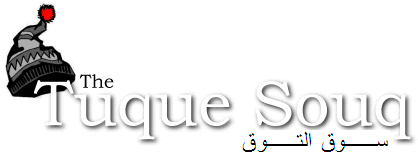 Iraqi security forces have thwarted what they believe to be an attempt by dissidents to finance a new rebellion by stealing ancient treasures and speculating in the global art market.
Iraqi security forces have thwarted what they believe to be an attempt by dissidents to finance a new rebellion by stealing ancient treasures and speculating in the global art market.After Iraqi police recovered three stolen, ancient Sumerian artifacts* valued at several hundred thousand dollars, high-ranking Iraqi security officials concluded that the conspiracy underlying the wave of art and artifact theft in Iraq is a clandestine cartel of terrorists who are planning to open their own art museum whose exorbitant entry fees will finance terrorist projects in perpetuity.
It's a sign of the times that freedom fighters and guerrilla groups aren't confining their fundraising endeavors to smuggling drugs, hijacking boats off the coast of Somalia, and sucking up to Osama. These days, say Iraqi authorities and their American overlords, you are as likely to find a terrorist at Sotheby's as you are a tuxedo-clad, Oxford-educated art thief at Sotheby's.
The recovery of 3 of Iraq's ancient treasures comes on the heels of the reclamation of a Picasso painting, valued at a slight $10-million, believed to have been stolen by Saddam Hussein during his 1990 invasion of Kuwait. (The stamp "Property of Kuwait" next to Picasso's signature was the give-away.) A suspected terrorist was trying to off-load it for a bargain $450,000.
 Iraqi archaeologists and antiquities experts face an uphill battle to recover the many thousands of historical artifacts looted since the beginning of the American occupation, as well as to preserve and defend the hundreds of archaeological sites in Iraq from future looters. The dusty earth of the "Cradle of Civilization" has yielded priceless treasures from the ancient worlds of Sumerians, Babylonians, Assyrians and Persians, including the world's earliest-known woven baskets, writing tablets, and wheels--all things known to be of use to terrorists.
Iraqi archaeologists and antiquities experts face an uphill battle to recover the many thousands of historical artifacts looted since the beginning of the American occupation, as well as to preserve and defend the hundreds of archaeological sites in Iraq from future looters. The dusty earth of the "Cradle of Civilization" has yielded priceless treasures from the ancient worlds of Sumerians, Babylonians, Assyrians and Persians, including the world's earliest-known woven baskets, writing tablets, and wheels--all things known to be of use to terrorists.Some experts fear that the terrorists are trying to recover all the seeds from the Hanging Gardens of Babylon--one of the seven wonders of the ancient world--which if rebuilt in the wrong hands could provide millions in tourist revenues for the coffers of evil-doers, which could then lead to terrorists buying up even more Picassos and becoming major players in a new, hyper-inflated global art market.
To be on the safe side of possibly supporting terrorists, American military officials are advising everyone in the world to stop going to museums until terrorism is destroyed completely.
* - The Sumerian statues in the photograph are not among those stolen... yet.

No comments:
Post a Comment